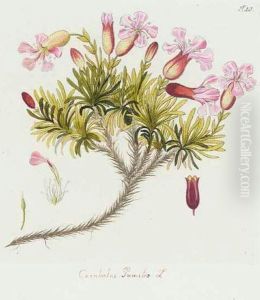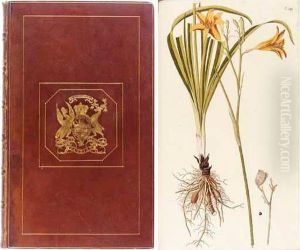Nicolaus Joseph Jacquin Paintings
Nicolaus Joseph Jacquin, also known as Nikolaus Joseph Freiherr von Jacquin or Josephus Nicolaus Jacquin, was a notable scientist rather than an artist, renowned for his work in botany, chemistry, and zoology during the 18th century. Born on February 16, 1727, in Leiden, Netherlands, Jacquin was the son of a wealthy merchant which allowed him to receive an excellent education. Initially, he studied medicine in Leiden, but his interest soon shifted towards botany.
In 1752, Jacquin was sent by Francis I, the Holy Roman Emperor, to the West Indies and Central America on a scientific expedition. His mission was to collect plants that could be cultivated in Austria for economic and medicinal purposes. He spent several years in the Caribbean, exploring regions such as Jamaica, Venezuela, Haiti, and Cuba. During this time, Jacquin amassed a vast collection of plants, animals, and mineral specimens.
After his return to Europe in 1755, Jacquin processed the results of his expedition, publishing several important works that included 'Enumeratio systematica plantarum', 'Selectarum Stirpium Americanarum Historia', and his most famous publication, 'Flora Austriaca', which was released from 1773 to 1778. These publications were richly illustrated and described many species new to science, contributing significantly to the fields of botany and zoology.
In 1759, Jacquin was appointed professor of chemistry and mineralogy at the University of Schemnitz (now Banská Štiavnica) and in 1768, he became the director of the Botanical Gardens of the University of Vienna and professor of botany and chemistry. Throughout his career, Jacquin continued to write and publish extensively, often including beautifully detailed illustrations in his works. He was ennobled by the emperor for his contributions to science and given the hereditary title 'Freiherr' (Baron) in 1774.
Nicolaus Joseph Jacquin's legacy is firmly established in the scientific community. A number of plant species are named in his honor, including the genus Jacquinia. He was also the father of Joseph Franz von Jacquin, who followed in his footsteps as a scientist. Jacquin's extensive work laid the foundations for future botanical and zoological research in many parts of the world. He died on October 26, 1817, in Vienna, leaving behind a rich legacy in the natural sciences.

